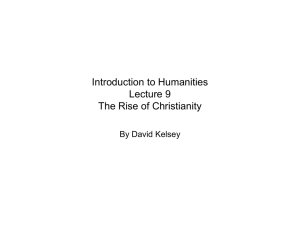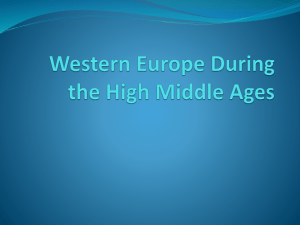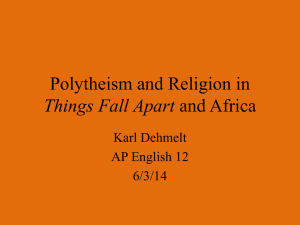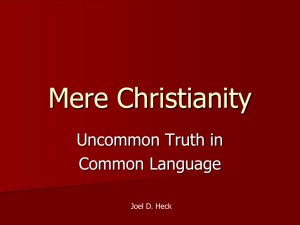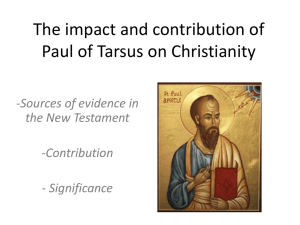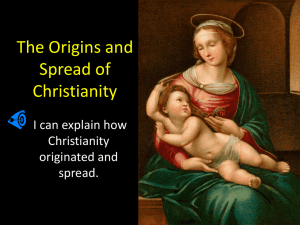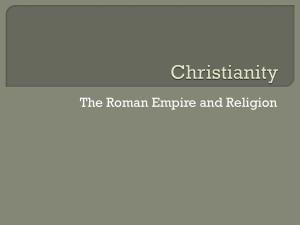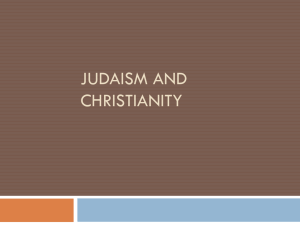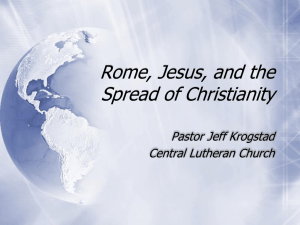Chapter 5: Rome and the Rise of Christianity
advertisement
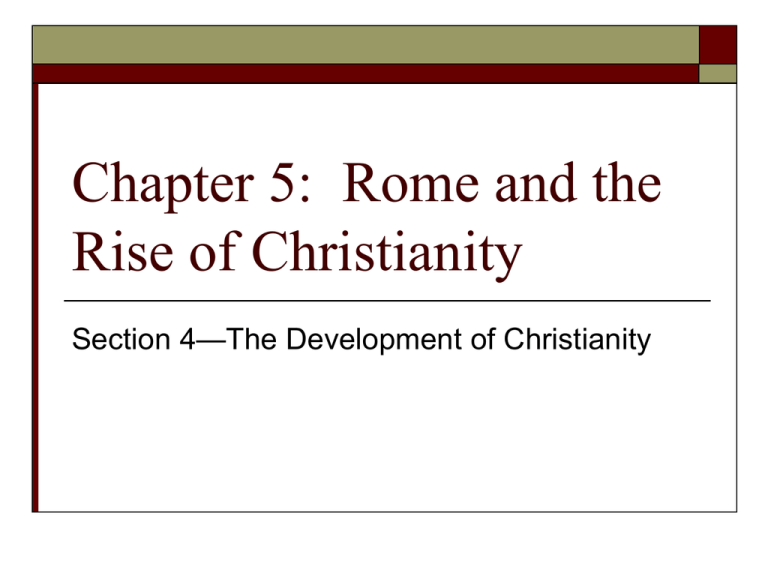
Chapter 5: Rome and the Rise of Christianity Section 4—The Development of Christianity The Development of Christianity The official state religion of the Roman Empire focused on the worship of a number of different gods and goddesses Jupiter (chief god), Juno (wife of chief god), Minerva (goddess of wisdom), Mars (god of war) In addition, emperors were often officially made gods by the Roman Senate Believed proper ritual by state priests brought them into a right relationship with the gods Mars, god of war The Development of Christianity A right relationship guaranteed peace and prosperity Romans believed their success proved that the gods looked with favor on them Romans were often tolerant to other religions Even adopted some local gods Roman conquest of eastern Mediterranean territories brought in numerous new religions Cicero: We have overcome all the nations of the world because we have realized that the world is directed and governed by the gods.” Minerva The Development of Christianity Many of these new religions were appealing Offered a more emotional and spiritual experience Offered life after death which was superior to this life Roman belief system was quite unemotional and not very rewarding to most Roman citizens Jupiter statue—warm and soothing? The Development of Christianity Describe how religion and government were connected in the Roman Empire. Emperors were often made gods The Romans believed that the observation of proper ritual guaranteed peace and prosperity Felt that the success of the Roman Empire was the result of being look at with favor by the gods The Development of Christianity AD 6: The area of Judaea became a Roman province under the rule of a procurator Jews were divided into 3 main groups: 1. 2. 3. Sadducees: favored cooperation with the Romans Essenes: awaited for a Messiah to save Israel from oppression and bring world peace Zealots: advocated violent overthrow of the Romans In AD 66—led a revolt Was crushed by the Romans four years later and the Jewish temple in Jerusalem was destroyed The Development of Christianity Destruction of the Temple in Jerusalem by Roman soldiers in AD 70 The Development of Christianity Name three of the Jewish groups in Judea and explain how they differed. Sadducees favored cooperation with the Romans Essenes awaited a Messiah to save Israel from oppression Zealots advocated violent overthrow of Roman rule The Development of Christianity Jesus of Nazareth: began his preaching during this time of confusion and conflict Assured his fellow Jews he would not harm their traditional religion “Do not think I have come to abolish the Law or the Prophets; I have not come to abolish them but to fulfill them” Jesus said the most important thing was the transformation of the inner person, not to necessarily follow the letter of the law “So in everything, do to others what you would have them do to you, for this sums up the Law and the Prophets.” The Development of Christianity Jesus taught that God’s law was to love God and one another Voiced ethical concepts of humility, charity, and love towards others This would go on to form the basis for the value system of medieval Western civilization The Development of Christianity Judaean authorities saw Jesus as a potential revolutionary They did not want another disastrous revolt against Rome Therefore, a Jewish court turned him over to Romans Procurator Pontius Pilate ordered his execution Crucifixion The Development of Christianity Jesus’ loyal followers believed he overcame death and returned to life They believed he was the Messiah Believed he was the long awaited Savior of Israel Simon Peter: a prominent figure of early Christianity he was a fisherman who helped spread the word of Jesus after his death Became known as Peter The Development of Christianity Peter and the other disciples taught that Jesus was the Savior, the Son of God, and had come to Earth to save all humans He also taught that the death of Jesus made up for the sins of all humans Jesus thus made it possible for salvation By accepting Jesus as Christ, they could be saved from the penalty of sin The Development of Christianity Paul of Tarsus: also preached in Jesus’ name Helped to spread Christianity throughout Asia Minor and along the shores of the Aegean Sea Within 60 days of word that Jesus escaped death, over 10,000 converts to Christianity Mostly spread orally, but also written Paul’s epistles outlined Christian beliefs These writings became known as the Gospels Most writings from AD40-100 Paul of Tarsus The Development of Christianity The Gospels formed the core of the New Testament At first, Romans paid little attention to Christianity Thought of as just another sect of Judaism Romans became more concerned as Christians began to refuse to worship the state gods and emperors Saw this as an act of treason—punishable by death Christians thought they would be risking their own salvation by worshipping ‘false gods’ The Development of Christianity Nero: Roman emperor from AD 54-68 He blamed Christians for a fire that destroyed much of Rome Many Christians were ordered to die cruelly This persecution actually strengthened Christianity Forced it to become more organized Fear allowed only the most committed to follow the faith "The Christian Martyrs' Last Prayer" by Leon Gerome The burning of Rome, Robert Hubert (1733- 1808), Musée André Malraux, Le Havre, France The Development of Christianity Why did the Roman authorities fear Jesus? Authorities saw him as a potential revolutionary who might lead Jews into another revolt against Rome. The Development of Christianity Bishops took more control of church communities Clergy: took on a larger role in the church Christianity: Grew quickly in the first century Took root in the second century (despite persecution) Spread very quickly in the third century The Development of Christianity 1. Why was Christianity able to attract so many followers? The Christian message 2. Familiarity 3. Roman’s state religion was impersonal and existed for the good of Rome Christianity was persona.>>>offered eternal salvation to individuals Idea was similar to other religions>>immortality as a result of sacrifice Fulfilled human need to belong Christians built communities bound to one another People could LOVE one another and HELP the poor and the sick Christianity satisfied the need to belong in a way that the Roman Empire never could provide The Development of Christianity Christianity attracted all classes Especially the poor and powerless Eternal life was promised to all “Christ is all and is in all” –Paul Spiritual equality to all was a revolutionary idea The Development of Christianity Roman emperor Diocletian led the last large Christian persecution during beginning of 4th century Even he admitted in records that Christianity was too strong to get rid of by force Constantine: became the first Christian emperor Edict of Milan (AD 313): Constantine proclaimed official tolerance of Christianity Theodosius the Great: adopted Christianity as official state religion of Rome The Development of Christianity Why and how did the Christian church become more organized in the second and third centuries? Fear of persecution meant that only the most committed individuals would choose to follow Christianity. Bishops began to assume more control over church communities, and the clergy developed distinct functions over the regular church members (laity) The Development of Christianity Christianity Video—28 mminutes The Development of Christianity The Development of Christianity Procurator: In the Roman Empire, an official in charge of a province New Testament:Writings by Jesus’ disciples mostly from between AD40—100 Describe the personal accounts of Jesus Known as the Gospels *record Jesus’ life and teachings and are the second main part of the Christian Bible The Development of Christianity Clergy: Laity: Regular church members Church leaders The Development of Christianity Jesus of Nazareth: Simon Peter: Founder of Christianity Fisherman who became a follower of Jesus Taught that Jesus came to Earth to save all humans and his death made up for the sins of all humans Very instrumental in initial spread of Christianity Edict of Milan: In AD 313, proclaimed official tolerance of Christianity in the Roman Empire The Development of Christianity Paul of Tarsus: Highly educated Jewish Roman citizen Followed command of Jesus to preach Constantine: Founded many Christian communities in Asia Minor and along Aegean Sea Became the first Roman Emperor to convert to Christianity Theodosius the Great: Emperor who adopted Christianity as the official religion of the Roman Empire The Development of Christianity Explain why the Romans persecuted the Christians despite their general religious tolerance. Christians refused to worship state gods and the emperor and this was seen as treason The Development of Christianity List the ethical concepts voiced by Jesus. Humility Charity Love The Development of Christianity Explain why Romans began to accept Christianity and why it took so long for it to be accepted by the state. Romans began to accept it because Christianity was more personal and meaningful than the Roman state religion It took long to become accepted because rejecting the state gods was seen as treason The Development of Christianity Fill in the chart below showing characteristics of the Roman State Religion and of Christianity. Roman State Religion Christianity Polytheistic Monotheistic Emperors were made gods Jesus is the Messiah Rituals bring prosperity God’s command is to love Adopted other, local gods Salvation / eternal life available for all Worship of other gods imperils salvation
